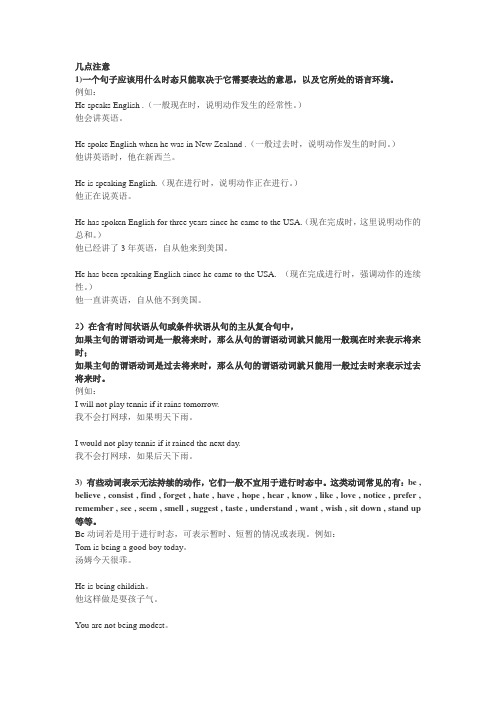句子时态
- 格式:doc
- 大小:57.00 KB
- 文档页数:6


关于英语句子时态语法【篇一】关于英语句子时态语法英语八种时态基本句型一、一般现在时1、肯定句:主语+动词原形(-s,-es)+ 其他。
2、否定句:主语+don’t/doesn’t+动词原形+其他。
3、一般句:Do/Does+主语+动词原形+其他?二、一般过去时1、肯定句:主语+动词-ed+其他。
2、否定句:主语+didn’t+动词原形+其他。
3、一般句:Did+主语+动词原形+其他?三、现在进行时1、肯定句:主语+am/is/are+动词-ing +其他。
2、否定句主语+am/is/are+not+动词-ing+其他。
3、一般句:Am/Is/Are+动词-ing+其他?四、过去进行时1、肯定句:主语+was/were+动词-ing+其他。
2、否定句:主语+was/were+not+动词-ing+其他3、一般句:Was/Were+主语+动词-ing+其他?五、一般将来时1、肯定句:主语+will/shall+动词原形+其他.2、否定句:主语+won’t/shan’t+动词原形+其他.3、一般句:Was/Shall+主语+动词原形+其他?六、过去将来时1、肯定句:主语+would/should+动词原形+其他。
2、否定句:主语+wouldn’t/shouldn’t+动词原形+其他。
3、一般句:Would+主语+动词原形+其他?七、现在完成时1、主语+have/has+过去分词+其他。
2、主语+haven’t/hasn’t+过去分词+其他。
3、 Have/Has+主语+过去分词+其他?八、过去完成时1、肯定句:主语+had+过去分词+其他。
2、否定句:主语+hadn’t+过去分词+其他。
3、一般句:Had+主语+过去分词+其他?【篇二】关于英语句子时态语法1. 一般现在时用法:A) 表示现在发生的动作、情况、状态和特征。
B) 习惯用语。
C) 经常性、习惯性动作。
例:He always helps others. (他总是帮助别人。

高中英语句子时态句子以下是一些高中英语时态句子示例:1. 现在进行时态:I am studying English right now. (我正在学习英语。
)2. 过去进行时态:She was dancing with him last night. (她昨晚和他一起跳舞了。
)3. 将来进行时态:They will be arriving at the airport tomorrow morning. (他们明天早上将会到达机场。
)4. 现在完成时态:I have studied English for three years. (我已经学了三年的英语了。
)5. 过去完成时态:She had finished her homework before dinner. (她在晚饭前已经完成了作业。
)6. 将来完成时态:They will have arrived at their destination by the end of the day. (他们将在今天结束之前到达目的地。
)7. 现在完成进行时态:I have been studying English for the past three years. (在过去的三年里,我一直在学习英语。
)8. 过去完成进行时态:She had been dancing with him all night. (她整个晚上都在和他跳舞。
)9. 将来完成进行时态:They will have been working on the project for months by the time it is finished. (当项目完成时,他们将已经工作了几个月。
)。

几点注意1)一个句子应该用什么时态只能取决于它需要表达的意思,以及它所处的语言环境。
例如:He speaks English .(一般现在时,说明动作发生的经常性。
)他会讲英语。
He spoke English when he was in New Zealand .(一般过去时,说明动作发生的时间。
)他讲英语时,他在新西兰。
He is speaking English.(现在进行时,说明动作正在进行。
)他正在说英语。
He has spoken English for three years since he came to the USA.(现在完成时,这里说明动作的总和。
)他已经讲了3年英语,自从他来到美国。
He has been speaking English since he came to the USA. (现在完成进行时,强调动作的连续性。
)他一直讲英语,自从他不到美国。
2)在含有时间状语从句或条件状语从句的主从复合句中,如果主句的谓语动词是一般将来时,那么从句的谓语动词就只能用一般现在时来表示将来时;如果主句的谓语动词是过去将来时,那么从句的谓语动词就只能用一般过去时来表示过去将来时。
例如:I will not play tennis if it rains tomorrow.我不会打网球,如果明天下雨。
I would not play tennis if it rained the next day.我不会打网球,如果后天下雨。
3) 有些动词表示无法持续的动作,它们一般不宜用于进行时态中。
这类动词常见的有:be , believe , consist , find , forget , hate , have , hope , hear , know , like , love , notice , prefer , remember , see , seem , smell , suggest , taste , understand , want , wish , sit down , stand up 等等。

16种时态及语态总结在英语学习中,时态和语态是非常重要的语法点。
掌握好这 16 种时态及语态,对于准确表达意思、理解英语句子的含义至关重要。
下面我们就来详细了解一下这 16 种时态及语态。
一、一般现在时(Simple Present Tense)一般现在时表示经常发生的动作、习惯性的动作或者客观事实、真理等。
其结构为:主语+动词原形(当主语为第三人称单数时,动词要加“s”或“es”)。
例如:“I play football every weekend”(我每个周末踢足球。
)“He likes music”(他喜欢音乐。
)一般现在时的被动语态(Simple Present Passive Voice)结构为:am/is/are +过去分词。
例如:“The room is cleaned every day”(这个房间每天都被打扫。
)二、一般过去时(Simple Past Tense)一般过去时表示过去某个时间发生的动作或存在的状态。
其结构为:主语+动词的过去式。
例如:“I went to Beijing last year”(我去年去了北京。
)一般过去时的被动语态(Simple Past Passive Voice)结构为:was/were +过去分词。
例如:“The book was written by him”(这本书是他写的。
)三、一般将来时(Simple Future Tense)一般将来时表示将来要发生的动作或存在的状态。
其结构有多种,常见的有:will +动词原形、be going to +动词原形。
例如:“I will visit my grandparents tomorrow”(我明天将去看望我的祖父母。
)“She is going to have a party next week”(她下周要举办一个派对。
)一般将来时的被动语态(Simple Future Passive Voice)结构为:will be +过去分词、be going to be +过去分词。

五种句型八大时态七大语法一、五种句型1、简单句:由一个主语和一个谓语组成,是最基本的句型,如:He goes to school.2、并列句:由两个或两个以上的并列句子组成,如:He goes to school and she goes to work.3、复合句:由一个主句和一个从句组成,如:He goes to school when he is free.4、倒装句:将句子中的谓语动词放在主语之前,如:Here comes the bus.5、感叹句:表示感情的句子,如:What a beautiful day!二、八大时态1、一般现在时:表示经常性或习惯性的动作,如:He goes to school every day.2、一般过去时:表示过去发生的动作,如:He went to school yesterday.3、一般将来时:表示将来发生的动作,如:He will go to school tomorrow.4、现在进行时:表示正在进行的动作,如:He is going to school now.5、现在完成时:表示过去发生的动作对现在造成的影响,如:He has gone to school.6、过去进行时:表示过去正在进行的动作,如:He was going to school.7、过去完成时:表示过去发生的动作对过去造成的影响,如:He had gone to school.8、将来完成时:表示将来发生的动作对将来造成的影响,如:He will have gone to school.三、七大语法1、名词:表示人、事物或抽象概念的词,如:school, teacher, happiness.2、代词:替代名词的词,如:he, she, it.3、形容词:修饰名词的词,如:beautiful, tall, happy.4、动词:表示动作或状态的词,如:go, be, have.5、副词:修饰动词、形容词或其他副词的词,如:quickly, very, almost.6、介词:表示词与词之间的关系的词,如:in, on, at.7、连词:连接句子成分的词,如:and, but, or.。
关于时态的句子时态是语法中的一个重要概念,用于表示动作或状态发生的时间。
根据不同的情况,我们可以使用不同的时态来准确地描述事件。
下面是一些关于时态的句子示例,以帮助你更好地理解和应用时态。
1. 现在进行时:- 我正在写一篇关于时态的句子的文章。
- 他们正在开会讨论新的项目计划。
- 你为什么总是在手机上玩游戏?2. 一般现在时:- 我通常在晚上看电视。
- 他每天早上都去跑步。
- 我们在这家餐厅吃晚饭。
3. 一般过去时:- 我昨天去了一趟图书馆。
- 他小时候住在乡村。
- 我们在上周末去了海滩。
4. 过去进行时:- 昨天下午,我正在和朋友们一起打篮球。
- 他们上个月正在装修房子。
- 我们去年这个时候正在旅行。
5. 一般将来时:- 我明天要去看电影。
- 他下个月要搬到新的城市工作。
- 我们明年要举办一场盛大的庆祝活动。
6. 将来进行时:- 明天下午,我将会在家做作业。
- 下个周末,他们将会去郊游。
- 春节期间,我们将会在家和家人一起过年。
7. 现在完成时:- 我已经完成了这篇文章的写作。
- 他们已经看过这部电影了。
- 我们已经订好了明天的机票。
8. 过去完成时:- 我在他到达之前已经离开了。
- 他们在我们到达之前已经吃完了晚饭。
- 我们在他们回来之前已经完成了工作。
9. 现在完成进行时:- 我一直在学习新的技能。
- 他们一直在为明天的比赛做准备。
- 我们一直在等待好的机会。
10. 过去完成进行时:- 我们在他们来之前一直在为晚宴做准备。
- 他们在我们到达之前一直在等我们。
- 我们在他们离开之前一直在工作。
以上是关于时态的句子示例,涵盖了现在进行时、一般现在时、一般过去时、过去进行时、一般将来时、将来进行时、现在完成时、过去完成时、现在完成进行时和过去完成进行时。
通过正确使用时态,我们可以更准确地描述事件的发生时间和状态。
希望以上示例能够帮助你更好地理解和应用不同的时态。
、动词的时态1、一般现在时:表示经常发生的动作或存在的状态,句中常有often, usually, sometimes, always, every day 等词。
肯定句:主语+谓语(主语是第三人称单数时,谓语后+s/es) +其他部分否定句:主语+do n'doesn't+动词原形+其他部分一般疑问句:Do/Does+主语+动词原形+其他部分?回答:Yes,主语+do/does. / No,主语+don'/doesn' 特殊问句:疑问词+一般问句?2、一般过去时:表示过去发生的动作或存在的状态,句中常有yesterday, last year, in 1999 等词。
谓语动词用过去式。
肯定句:主语+谓语(动词的过去式)+其他部分否定句:主语+did n't+动词原形+其他部分一般疑问句:Did+主语+动词原形+其他部分?回答:Yes,主语+did. / No,主语+didn '特殊问句:疑问词+一般问句?3、现在进行时:表示现在正在发生的动作,句中常有now, at the moment. 构成:助动词be (is/am/are) + v-ing肯定句:主语+ be + v-ing +其他部分否定句:主语+ be + not + v-i ng+其他部分一般疑问句:Be +主语+ v-ing +其他部分?回答:Yes,主语+be. / No,主语+ be + not. 特殊问句:疑问词+一般问句?4、一般将来时:表示即将发生的动作,句中常有tomorrow, next year等构成:1)助动词will + 动词原形肯定句:主语+ will + 动词原形+ 其他部分否定句:主语+ will+ not + 动词原形+ 其他部分一般疑问句:Will +主语+动词原形+ 其他部分?回答:Yes, 主语+ will. / No, 主语+ won't.特殊问句:疑问词+一般问句?2)助动词be (is/am/are) going to + 动词原形肯定句:主语+ be going to + 动词原形+ 其他部分否定句:主语+ be not going to + 动词原形+ 其他部分一般疑问句:Be +主语+ going to + 动词原形+ 其他部分?回答:Yes,主语+ be. / No,主语+ be not.(常用缩写形式)特殊问句:疑问词+ 一般问句?二、练习1. Look! He ______________ (play) badminton (羽毛球)2. she _________ (visit) her grandparents next week .3. He ______ (get) up at 6:30 every day. And now they _______________(have) an English lesson.4. --What ____ your mother ______ (do)? -- She ________ (be) a doctor.5. My brother is a driver. He ______ (drive ) a taxi.6. He __________ (write) 4 letters to his father every month.7. When _______ your brother usually ________ (go) to work?8. There _________ (be) some water in the bottle.9. Yesterday I put a bottle on the table .There ________ (be) some water in the bottle.10. Don'tmake any noise. Grandma ___________ (sleep).11. They ____________ (look) at the wonderful picture and talking about it.12. Mr. Green ______________ (not have ) lunch at school.13. _____________ (not play ) games in the classroom.14. He ___________ (want) to get something __________ (eat ) for us.15. What _______ h e ________ (look) like?16. At the moment she ________________ (dance ).17. Sometimes he _______ (watch) TV in the living room,but he never ________ (play) games in it.18. --What ___________ you _____________________ (do) tomorrow?--I ______________________ (watch ) TV at home.19. _______ he ________ (do) the housework every day?20. Sandy ___________________ (not want ) _________ (play) the pianoevery Sunday, but Sue enjoys ________ (have ) her piano lesson.21. I _____ (see) a man under the tree just now .22. She asked him _________ (not play) games.23.I believe you ______________ (do) better next time.24. _____________ His family ________________________ (be) very big and all of his family (love) music.25.She didn'ttell me which room she ___________ (live) in.26. Listen! Who ____________ (sing) in the classroom ?27. He ______________ (not leave) the room until he closed the windows.28. ______ (do) the library __________ (open) at eight 'oclock?29. --When _______ you ___________ (see) it ? --Yesterday.30. Don'tworry. He ________ (ring) you up as soon as he _____ (get) home.5. 过去进行时:表示过去某一时刻或某一段时期正在发生的动作。
以下是每个英语六大时态的造句,每个时态包含十个句子:简单现在时(Simple Present Tense):I eat breakfast every morning.He goes to the gym twice a week.They speak English fluently.The sun rises in the east.We live in a small town.The bus arrives at 8 o'clock.She works as a teacher.Cats like to play with balls.My sister plays the piano beautifully.The Earth revolves around the sun.简单过去时(Simple Past Tense):I visited my grandparents last weekend.He studied English in high school.They went to the beach for vacation.She cooked dinner for the family yesterday.We played soccer in the park.The movie started at 7 p.m.He had a great time at the party.They lived in Paris for three years.My mom bought a new car.The company achieved its sales target.简单将来时(Simple Future Tense):I will visit my friend tomorrow.He is going to travel to Europe next month.They will finish the project by Friday.She will call you later.We are going to have a meeting in the afternoon.The concert starts at 8 p.m. tonight.He will become a doctor in the future.They are going to buy a new house.My parents will retire in two years.I will help you with your homework.现在进行时(Present Continuous Tense):I am studying for my exam.He is playing basketball with his friends.They are watching a movie at the cinema.She is cooking dinner in the kitchen.We are having a party tonight.The baby is sleeping in the crib.They are traveling to Europe this summer.The teacher is explaining the lesson to the students.He is working on a new project at the office.We are waiting for the bus at the bus stop.过去进行时(Past Continuous Tense):I was studying when the phone rang.He was playing guitar while his friends were singing.They were having dinner at the restaurant.She was reading a book in the library.We were watching a movie at home last night.The students were studying in the classroom.They were talking about their vacation plans.He was working late at the office.We were playing soccer in the park.She was cooking dinner for her family.将来进行时(Future Continuous Tense):I will be studying for my exam tomorrow.He will be playing tennis with his friends in the afternoon.They will be traveling to Japan next week.She will be working on a new project.We will be having a party on Saturday night.The students will be taking a test in the morning.They will be attending a conference next month.He will be waiting for you at the airport.We will be going to the beach for vacation.She will be cooking dinner for the family tonight.以上是每个时态的十个句子示例。
16种时态及语态总结动词时态和语态是语法中的重要概念,不仅决定了句子表达的时间和动作的发出者,还对句子的结构和语气产生影响。
本文将对16种时态及语态进行总结,并对其用法进行深入解析。
1. 现在简单时态现在简单时态表示经常性、习惯性或客观真理等情况,一般形式为:主语 + 动词原形(第三人称单数形式需加-s)。
例句:The sun rises in the east.(太阳从东方升起)2. 过去简单时态过去简单时态表示过去某个具体时间发生的动作或状态,一般形式为:主语 + 动词过去式。
例句:She called me yesterday.(她昨天给我打电话)3. 将来简单时态将来简单时态表示将要发生的动作或状态,一般形式为:主语 +will + 动词原形。
例句:I will visit my parents next week.(下周我会去看望我的父母)4. 现在进行时态现在进行时态表示现在正在进行的动作,一般形式为:主语 +am/is/are + 动词的现在分词。
例句:They are studying in the library now.(他们现在正在图书馆学习)5. 过去进行时态过去进行时态表示过去某一时刻正在进行的动作,一般形式为:主语 + was/were + 动词的现在分词。
例句:I was watching TV when he called me.(他给我打电话的时候,我正在看电视)6. 将来进行时态将来进行时态表示将来某一时刻正在进行的动作,一般形式为:主语 + will be + 动词的现在分词。
例句:She will be studying abroad this time next year.(明年这个时候她将在国外留学)7. 现在完成时态现在完成时态表示过去发生的动作对现在造成的影响或状态,一般形式为:主语 + have/has + 动词的过去分词。
例句:He has already finished his homework.(他已经完成了作业)8. 过去完成时态过去完成时态表示过去某个时间或动作发生之前已经完成的动作,一般形式为:主语 + had + 动词的过去分词。
一般现在时、一般过去时、一般将来时、现在进行时、过去进行时、现在完成时、过去完成时,过去将来时,现在完成进行时。
常用的时态只有八种。
1.一般现在时的用法1)表示经常性、习惯性的动作;表示现在的状态、特征和真理.句中常用often,usually,every day等时间状语。
例如:He goes to school every day.(经常性动作) He is very happy.(现在的状态)The earth moves around the sun.(真理)2)在时间状语从句和条件状语从句中,用一般现在时表示将来.例如:If you come this afternoon,we' ll have a meeting.When I graduate,I’ll go to the countr yside.3)有时这个时态表示按计划、规定要发生的动作,(句中都带有时间状语)但限于少数动词如begin,come,leave,go,arrive,start,stop,return,open,close等.例如:The meeting begins at seven. The train starts at nine in the morning.4)表示状态和感觉的动词,如be,like,hate,think,remember,find,sound等常用一般现在时.例如:I like English very much. The story sounds very interesting.5)书报的标题,小说等情节介绍常用一般现在时.2.一般过去时的用法l)表示过去某时间发生的事、存在的状态或过去反复发生的动作.He saw Mr Wang yesterday. He worked in a factory in 19862)表示过去经常发生的动作,也可用―used to‖和―would +动词原形‖。
例如:I used to smoke. During the vacation I would swim in the sea.注意;used to表示过去常发生而现在不再发生的动作或存在的状态。
另外?―to be used to +名词(动句词)―表示‖习惯于……。
例如I am used to the climate here. He is used to swimming in winter.3.一般将来时的用法一般将来时表示将来的动作或状态,其表达形式除了― will或shall十动词原形‖外,还有以下几种形式.l)― to be going to十动词原形‖,表示即将发生的或最近打算进行的事.例如:It is going to rain. We are going to have a meeting today.2) go,come,start,move,sail,leave等可用进行时态表示按计划即将发生的动作.例如:I’m leaving for Beijing.3)―be to十动词原形‖表示按计划要发生的事或征求对方意见.例如:Are we to go on with this work? The boy is to go to school tomorrow.4)― be about to十动词原形‖表示即将发生的动作。
例如:We are about to leave.5)某些词,如come,go,leave,arrive,start等的一般现在时和现在进行时也可表示将来.The meeting starts at five o’clock. He is leaving tomorrow.4.现在进行时的用法1)现在进行时表示现在正在进行的动作,由― to be十现在分词‖构成,另外―系动词十介词或副词‖也表示进行时的意义.例如:What are you doing? The bridge is under construction.2)表示感觉,愿望和状态的某些动词如have,be,hear,see,like等词一般不用进行时.5.过去进行时的用法l)过去进行时表示过去某一时刻、某一阶段正进行的动作,由― wa s(were)十现在分词‖构成.例如:In 1980 he was studying in a university. He was reading a novel when I came in.6.现在完成时的用法现在完成时由― have十过去分词‖构成.其使用有两种情况:1)现在完成时所表示的动作在说话之前已完成,而对现在有影响.句中没有具体时间状语.例如He has gone to Fuzhou. (说话人认为他不在该地) He has been to Fuzhou.(说话人认为他在该地)2)现在完成时所表示的动作开始于过去,持续到现在,也许还会持续下去.常用for和since表示一段时间的状语或so far,now,today, this week( month,year)等表示包括现在时问在内的状语。
例如:He has studied English for 5 years.He has studied English since 1985.Now I have finished the work.注意:表示短暂时间动作的词,如come,go,die,marry,buy等的完成时不能与for,since等表示一段时间的词连用.3)现在完成时还可用在时间和条件状语从句中、表示将来某时完成的动作.例如:I’ll go to your home when I have finished my homework.If it has stopped snowing in the morning,we’ll go to the park.7.过去完成时的用法l)过去完成时由― had十过去分词‖构成。
过去完成时的动词表示过去某一时刻或某一动作之前完成的动作或状态.句中常用by,before,until,when等词引导的时间状语.例如:By the end of last year we had built five new houses.I had learnt 5000 words before I entered the university.2)过去完成时的动词还可表示过去某一时刻之前发生的动作或状态持续到过去某个时间或持续下去。
例如:Before he slept,he had worked for 12 hours.8.过去将来时的用法过去将来时表示从过去的某时间看来将要发生的动作或存在的状态.过去将来时由― should或would十动词原形‖构成。
第一人称用should,其他人称用would.例如:They were sure that they would succeed.9.现在完成进行时的用法现在完成进行时由― have(has)十been十现在分词‖构成,表示现在以前一直在进行的动作。
有些词,如work,study、live,teach等用现在完成进行时与用现在完成时意思差不多.例如:I have worked here for three years.I have been working here for three years.但多数动词在这两种时态中表示不同意思.例如:I have written a letter(已写完) I have been writing a letter.(还在写)注意:表示短暂动作的动词,如finish,marry,get up,come,go等不能用这种时态.过去将来时一般过去将来时表示从过去的某一时间来看将来要发生的动作或存在的状态。
过去将来时常用于宾语从句和间接引语中。
一般过去将来时的出发点是过去,即从过去某一时刻看以后要发生的动作或状态。
过去将来时的构成(句型如下:)肯定句:主语+be(was,were)going to+动词原形+其他否定句:主语+be(was,were)not going to+动词原形+其他疑问句:Be(Was,Were)+主语+going to+动词原形+其他肯定句:主语+would(should)+动词原形+其他否定句:主语+would(should)not+动词原形+其他疑问句:Would(Should)+主语+动词原形+其他1同一般将来时,把系动词be变为过去式,把will,shall变为过去式。
例句:I didn't know if he would come. =I didn't know if he was going to come.我不知道他是否会来。
She was sixty-six. In three years,she would be sixty-nine. 她66岁了。
三年后,她是69岁。
She told us that she would not go with us,if it rained. 她告诉我们,如果下雨,她就不和我们一起去了。
I didn't know how to do it. What would be their ideas?我不知如何去做,他们会有什么想法呢?2.过去将来时常可用来表示过去习惯性的动作。
此时,不管什么人称,一律用would。
This door wouldn't open. . 这扇门老是打不开。
Whenever he had time,he would do some reading. 他一有时间,总是看书。
I would play with him when I was a child. 当我还是孩童时,总是和他一起玩。
如:You know I would come. 你知道我会来的。
We never imagined that John would become a doctor. 我们从未想过约翰会成为一个医生。
过去将来时有时可带时间状语。
如:He said he would come back the next day. 他说他第二天回来。
1"was/were going to + 动词原形"或"was/were +动词不定式完成式"可表示未能实现的过去将来时间的动作。
Last Sunday we were going to visit the Great Wall, but it rained.上星期天我们本想去游览长城的,但却下雨了。
(没有去成)I was to have helped with the performance, but I got flu the day before.我是打算帮忙演出的,但前天我感冒了。